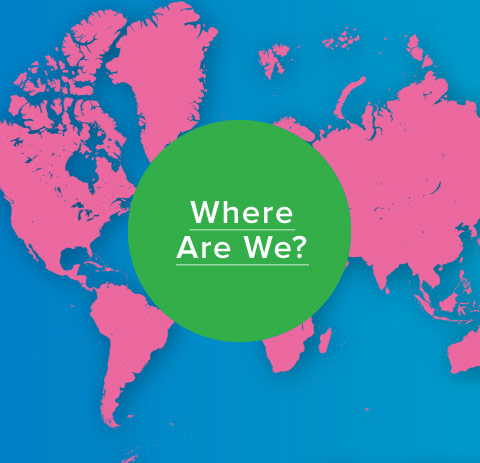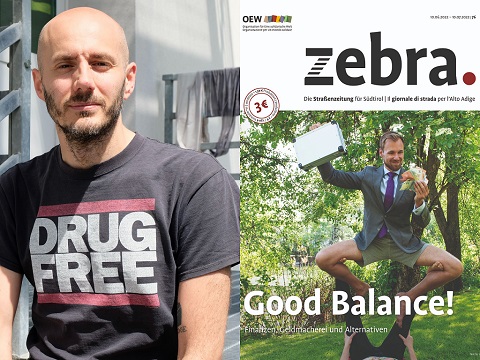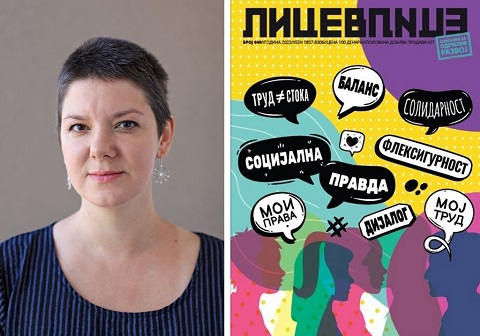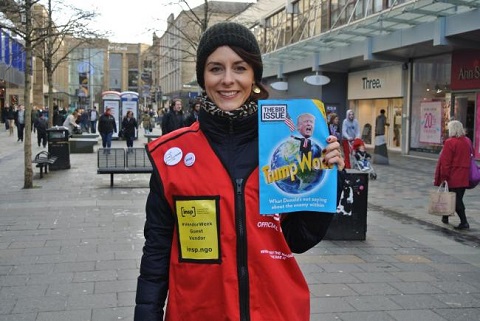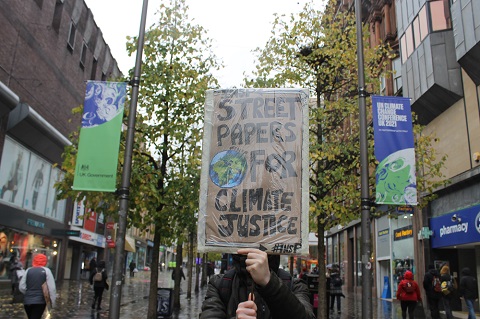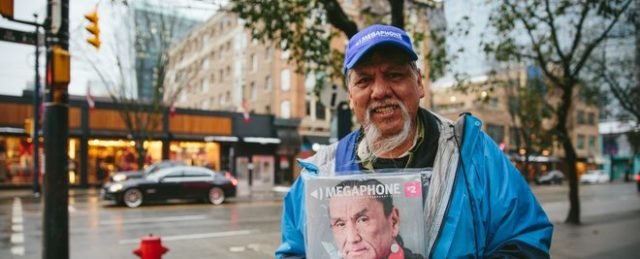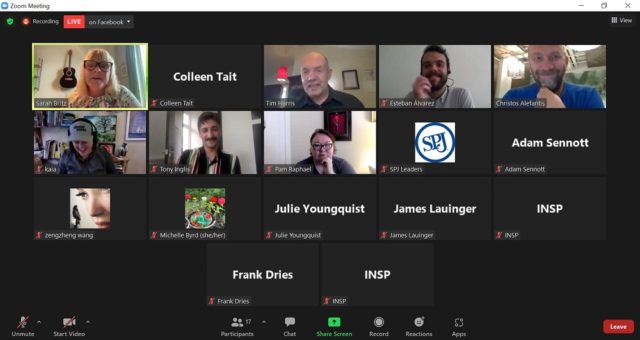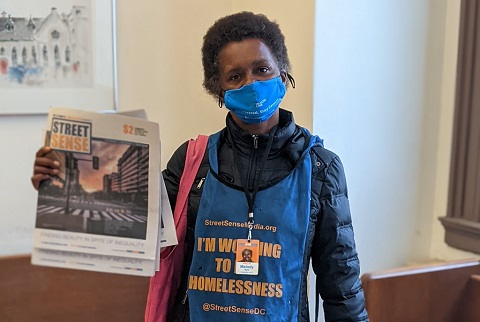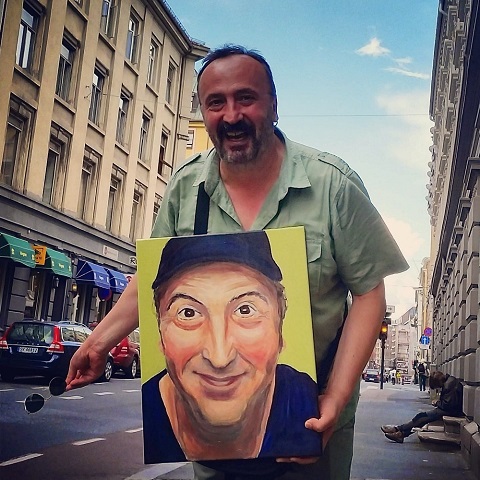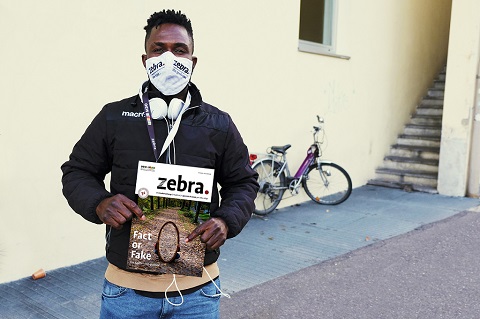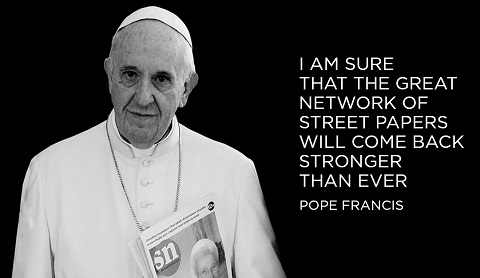By Arkady Tyurin, Put Domoi
Russia’s only street paper Put Domoi, known as Na Dne up until 2003, came into being in St Petersburg’s most famous art squat, Pushkinskaya 10, 24 years ago. The birthplace determined the type of content – from the outset the pages of our paper have been filled with alternative journalism and literature, as well as graphic and photographic projects. At the same time, several years ago, Russia’s most famous tabloid Argumenty i Fakty (with a circulation of 5.5 million copies), stated that being published in Put Domoi is a certificate of professionalism for an author. A short time later, we were included in the top 100 for Russian design.
The economics of our project are also not quite normal for the majority of the world’s street papers. We have no sponsors or government support. We earn all our money ourselves, and this is our own decision – after all, to spread the technique of survival, you need to start with yourself, do you not? Therefore, this is how it looks when each issue come out. Being qualified professionals, we earn money doing various parallel projects – we adapt films for the blind, hold exhibitions, design and prepare books for printing, work as PR and crisis managers in NGOs who lack expertise in these areas. The money earnt is spent in the production of the new edition, which then comes back to us when our vendors begin selling.
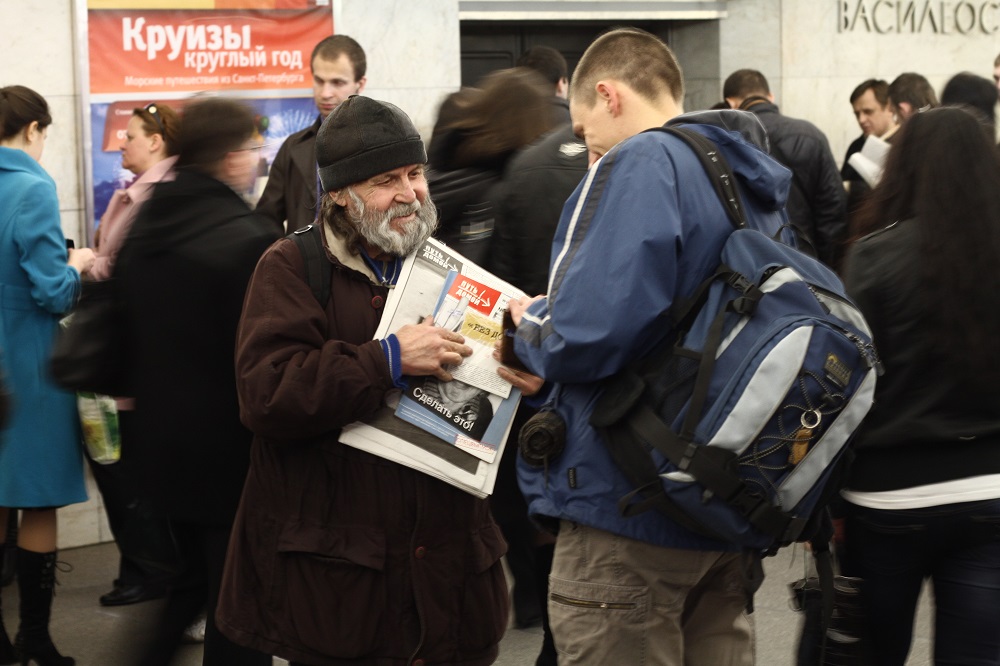
We have very few vendors, no more than a dozen. And they are all quite old, disabled or have mental health issues. The reality is that physically healthy and sober homeless people in St Petersburg can find well-paid illegal work – albeit not straight away. Those who do not want to do this can quite successfully use the services of numerous charitable organisations, where they can get clothes and food, the majority of which they can exchange for denatured alcohol. That’s why we’ve ended up with people with weak bodies, while the strong ones have lived most of their lives and to this day do so without doing honest work. And we have promised ourselves that we will stick with our vendors to the last and will continue to publish our paper, even if we only have one vendor left.
A homeless person in Russia is not just a person without a home. Practically all social and medical assistance provided by the state in Russia is tied to a person’s registration at their place of residence, known as a ‘Propiska’. If for any reason (family circumstances, fraudulent dealings in relation to residential real estate, irretrievably lost documents) that person loses their registration and is effectively expelled from society: they cannot be given legal employment, receive free medical assistance, apply to judicial bodies, register a marriage, educate their children; around four million people in Russia are not registered.
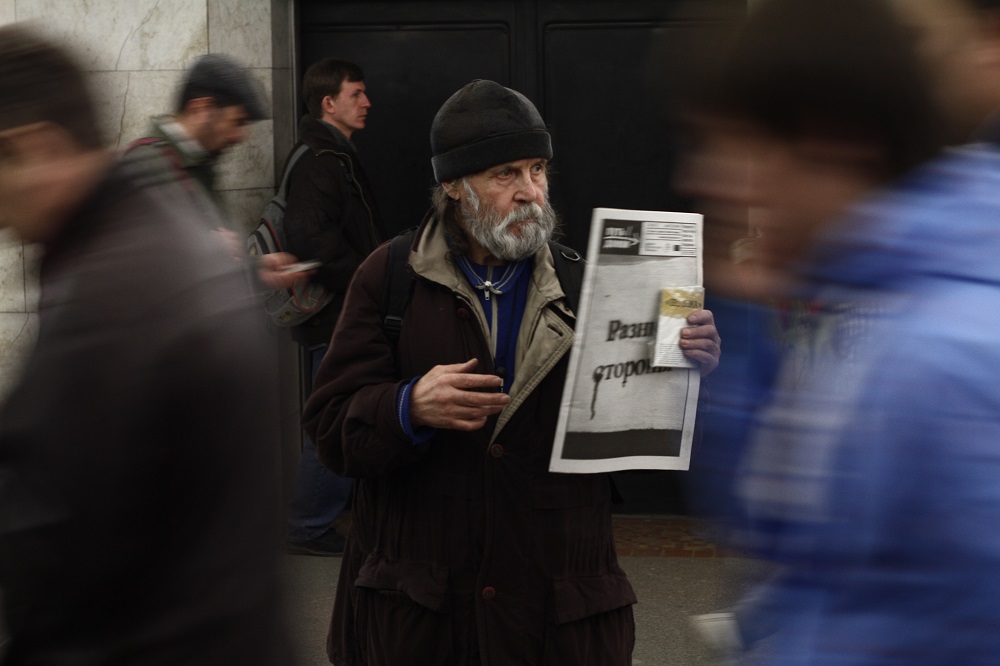
A good number of these four million are young people from all over Russia, who went to the big city in St Petersburg to find happiness, lived five to a room, risked being cheated – and themselves began to deceive their parents by telling them that everything was good and that they would soon become managing directors. But their parents were far away, and cheap drugs, that helped to alleviate stress, were close at hand.
The general love for football has helped this game to become a wonderful means for social reintegration. Football not only promotes a healthy lifestyle, but also the skills of working in a team, so necessary for reintegration in life. Homeless people have been playing football since 2003, when the International Network of Street Papers organised the first ever Homeless World Cup. The team from the street paper Put Domoi has also existed since 2003, made up of those who came to St Petersburg but did not become managing directors, but who grew into men because they stuck together and were able to keep away from drugs. In memory of this, the most common ailment in the team is sinusitis – “because the quality of the powder was not always good,” our cheerful players explain guiltily.
As in real football clubs, we have our legionnaires. Our biggest name (both in terms of size and feel for the game) is goalkeeper Johann Grasshof, a social worker from Hamburg. At one time, when he was working with the homeless in one of St Petersburg’s charitable organisations, he provided another kind of service. He found out about our team, sought permission to come to training, came, trained and played for us throughout his stay in St. Petersburg. Several years later he came back to the city to write a paper and called us. Since then we have remained in touch – at least, online. Our wonderful goalkeeper tries to attend all the international football tournaments that our team plays in. On the 25th February he was part of the team that won the Baltic Cup in mini-football for the homeless and chemically-dependent in Helsinki, Finland.
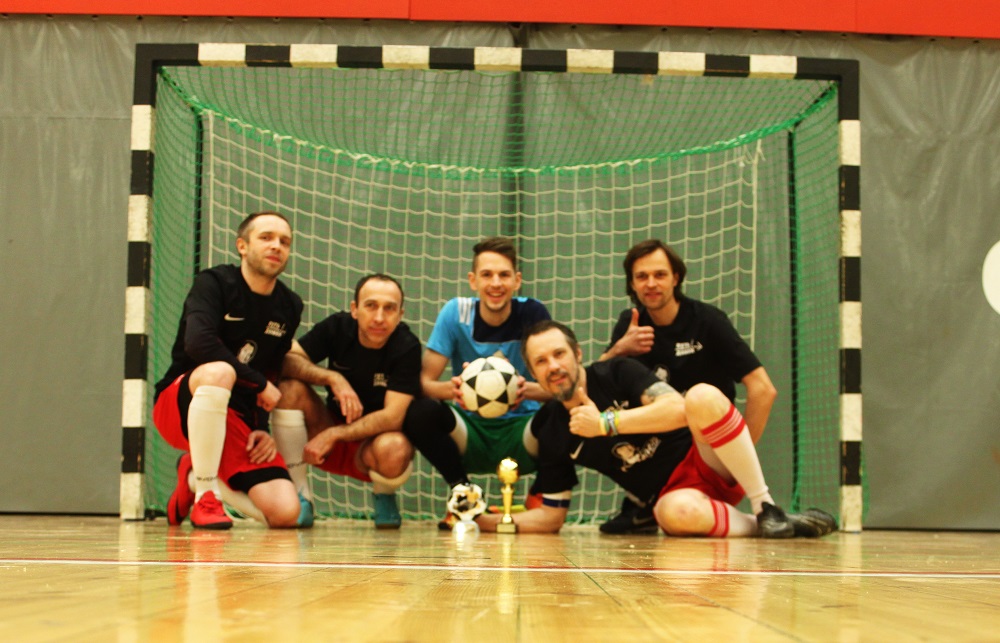
And now our whole city is getting ready for big-time football – as St Petersburg will be hosting a number of games in the world’s biggest championship – the 2018 FIFA World Cup. Vitaly Petrovich Shashlov, one of our most well-known vendors, is hoping to fulfil his dream to be a volunteer at the championships and try to speak only in English from our distribution point.
What will the championships give to the homeless? There is no reason to believe that the response will be negative towards them, as it was for example during the 1980 Moscow Olympics, when socially-excluded people were removed from the city to make it look more attractive. Life has shown that it is easier and more profitable to be yourself than to try to look better.
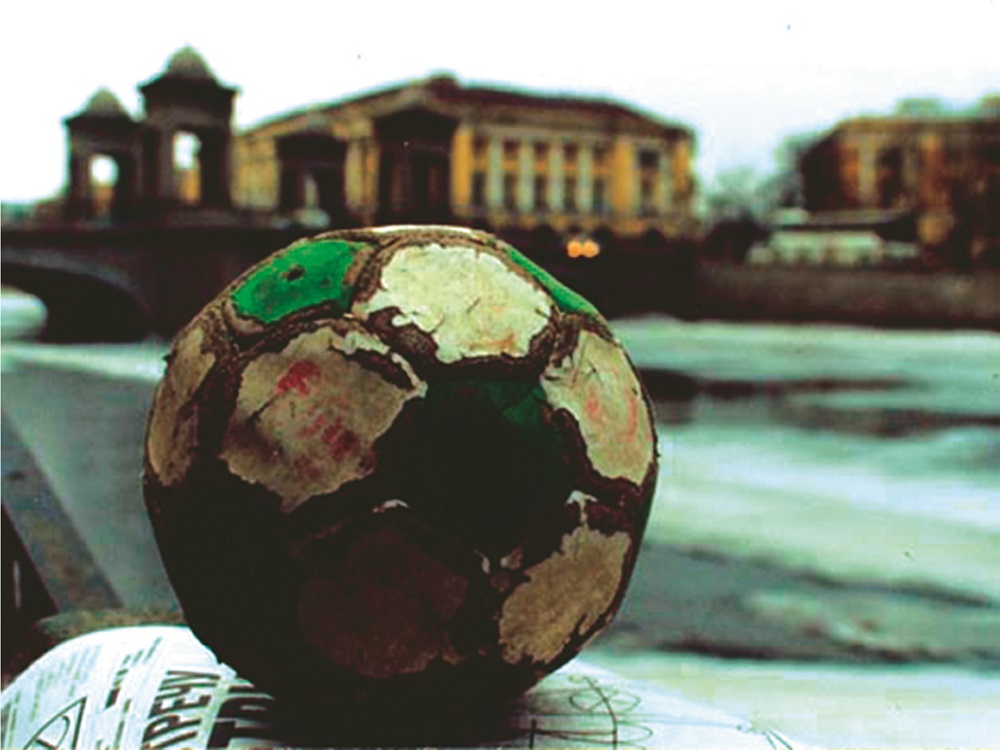
At the same time, we do not expect a growth in sales for our paper during the championship, as our readers are very similar to the admirers of that great German group Kraftwerk – that is, thinking students, bohemians and members of the intellectual middle class. Football is perhaps the best model for human life. Because football, like human life, is a team game. It is unimaginable not only without partners, but also without competitors. Not only without selfless work, but also without respect for rules and the law. Not only without pain, but also without the joy of overcoming it. Therefore, the main thing that football gives to those connected with it is a reminder that the game is never over. That there is always one more try.
It would be great if the whistle would blow after these words.
Arkady Tyurin, editor-in-chief of Put Domoi, homeless in 1995-1997, FC ‘Put Domoi’ player since 2003
This article appeared in German street paper Trott-War’s special World Cup edition in May of this year
Translated from Russian by Edward Alaszewski




